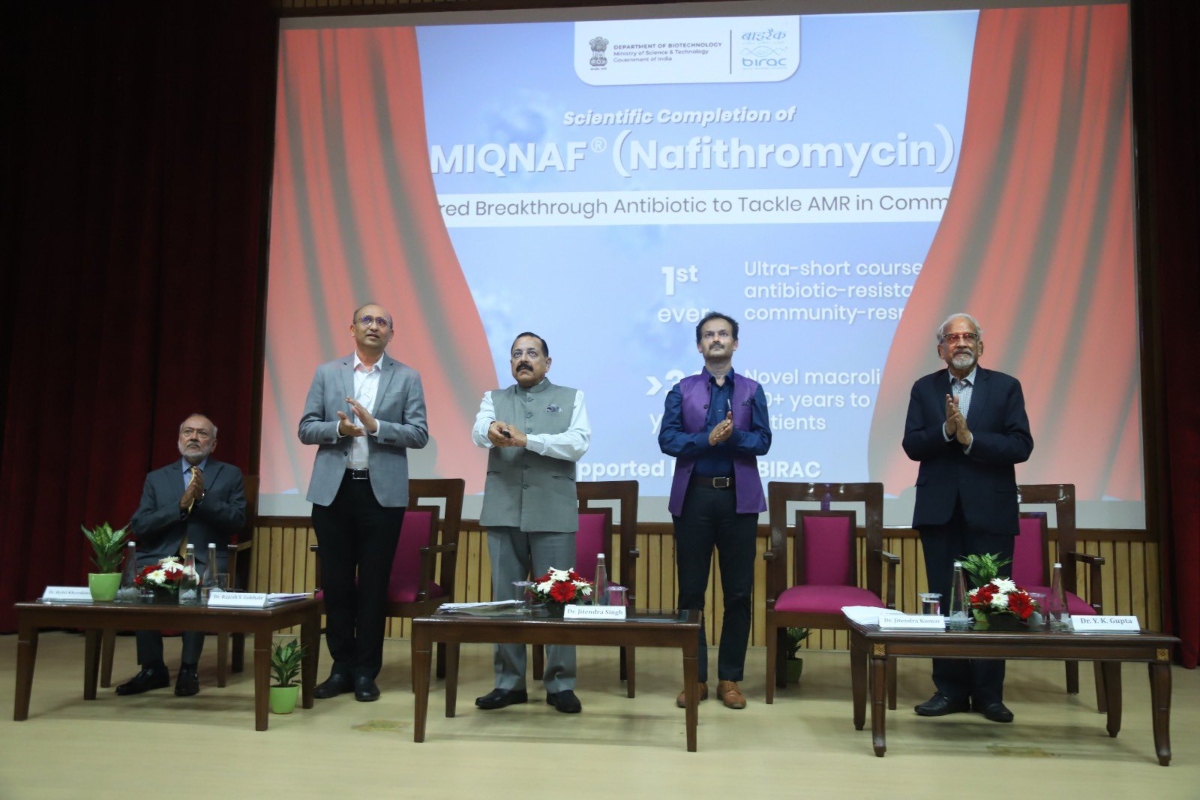NEW DELHI: India has achieved a big breakthrough with the creation of Nafithromycin, a new antibiotic marketed as Miqnaf, to handle severe cases of sepsis, bacterial and viral infections.
This new antibiotic, targets Community-Acquired Bacterial Pneumonia (CABP), a condition that causes over 2 million fatalities globally each year and will help in fight against antimicrobial resistance (AMR).
Dr. Sriram, MD, of MY Hospital in Indore, emphasised the significance of this invention, particularly in places such as Southeast Asia and Sub-Saharan Africa where CABP is endemic.
“Community-acquired pneumonia causes 2 to 2.5 million deaths annually, primarily affecting children under five and seniors over 70 due to their weaker immunity. This breakthrough would help protect children and seniors and also bring more pharma companies looking to partner with India on research,” he told The New Indian.
Be part of history as @DBTIndia and @BIRAC_2012 announce the scientific completion of #Nafithromycin (Miqnaf). This milestone marks a major step in combating the global AMR crisis.#BIRAC #WAAW2024 #WorldAMRAwarenessWeek #AMR #AMRAwarenessWeek pic.twitter.com/kflEWCSap7
— DBT-BIRAC (@BIRAC_2012) November 19, 2024
Developed by Wockhardt with backing from the Biotechnology Industry Research Assistance Council (BIRAC) of the Department of Biotechnology, Nafithromycin is ten times more effective than azithromycin and only takes a three-day regimen to achieve comparable results.
It effectively combats drug-resistant bacteria while providing greater tolerability, low side effects, and no major drug interactions.
Speaking of the reasons of developed resistance, Dr. added, “Medical professionals also add that resistance to existing antibiotics, such as azithromycin, has increased resistance in India as a result of incorrect dosing, unregulated drug access, and the presence of unlicensed practitioners.”
That in such cases, this new drug would help control outbreaks in states like Bihar, Uttar Pradesh and West Bengal which have struggled with poor health facilities over the last 50 years.
Despite the availability of vaccinations such as NPPSE 23 and PCB in India, insufficient awareness hinders their use, putting vulnerable groups at risk.
Nafithromycin, developed with research of more than 10 years with a Rs 500 crore investment, has undergone extensive clinical trials for 14 years across India, the U.S., and Europe.
ALSO READ: Feeling Lonely? Watch to Know What Psychologist Suggests – THE NEW INDIAN
The drug’s unique ability to directly target the lungs could significantly curb infections at their initial stage, providing a critical tool in the global fight against AMR.
Currently awaiting final manufacturing approval from the Central Drugs Standard Control Organization (CDSCO), Nafithromycin is a testament to India’s growing capabilities in biotechnology and its commitment to addressing global health challenges.
This landmark achievement showcases the importance of public-private collaboration in healthcare and positions India as a leader in combating AMR, offering renewed hope for effective and accessible treatments.









